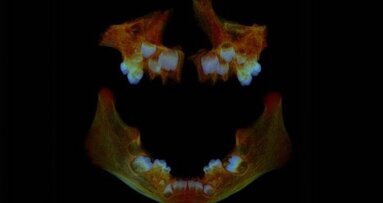LONDON, UK: Though the relative benefits of chewing gum are often subject to debate, a number of studies have shown that the sugar-free varieties can promote oral health. On this topic, a recent review has found some evidence that chewing sugar-free gum could help to reduce the further development of dental caries in both adults and children.
The systematic review was conducted by researchers from King’s College London. They identified and subsequently analysed 12 studies published over the last 50 years that explored the impact on oral health and the intervention outcomes of chewing sugar-free gum.
The research team found that chewing sugar-free gum reduces the incidence of dental caries by 28% and that it could be used as a possible preventive agent in combination with oral health education and supervised toothbrushing initiatives. However, the researchers were quick to clarify that their findings were far from definitive for a number of reasons.
“There is a considerable degree of variability in the effect from the published data and the trials included were generally of moderate quality,” explained lead author Dr Avijit Banerjee, Professor of Cariology and Operative Dentistry at King’s College London.
“However, we felt there was a definite need to update and refresh existing knowledge about sugar-free gum and its effect on dental caries and oral health. We are planning further research to determine the acceptability and feasibility of using this method in public health,” Banerjee continued.
Previous studies have shown that chewing gum can increase the level of certain vitamins in blood plasma, as reported last year by Dental Tribune International. The specific relationship between the development of dental caries and chewing sugar-free gum had not previously been explored, according to Banerjee.
The study, titled “A systematic review and meta-analysis of the role of sugar-free chewing gum in dental caries”, was published online on 19 November 2019 in the Journal of Dental Research: Clinical and Translational Research, ahead of inclusion in an issue.
Tags:
YORK, UK: Fear of the dentist is something some people suffer from more than others. With multiple reasons for dental anxiety and its effects, there is ...
BRADFORD, UK: Unlike bones, children’s teeth continue to grow during periods of undernourishment and record high nitrogen values, providing a kind of ...
BELFAST, UK: According to a new study by researchers at Queen’s University Belfast, aspirin could reverse the effects of dental caries. According to the ...
EDINBURGH, UK: A study by researchers at the University of Edinburgh has shown that a natural chemical related to those found in liquorice root could help ...
CARDIFF, UK: The Welsh could be facing higher prices for chewing gum. An assembly member has called for a 5p tax on every such item to help pay for the cost...
BIRMINGHAM, England: Diabetes is one of the most common chronic conditions in Europe and is strongly associated with periodontitis. An estimated one in ...
READING, UK: Earworms, from the German “Ohrwurm”, are catchy tunes that repeat in one’s head. A recent poll suggested that over 90 per ...
LONDON, UK: In a personal manifesto, British chef, broadcaster and food campaigner Jamie Oliver has called for a ban on chewing gum in public in order to ...
A new method of controlling inflammation and sugar levels for oral and systemic disease prevention using a common diabetes drug has been discovered by a ...
MANCHESTER/CAMBRIDGE, UK: Over half a million deaths per year result from malaria, caused by parasites of the genus Plasmodium, and with increasing ...
Live webinar
Tue. 24 February 2026
6:00 pm UTC (London)
Prof. Dr. Markus B. Hürzeler
Live webinar
Tue. 24 February 2026
8:00 pm UTC (London)
Prof. Dr. Marcel A. Wainwright DDS, PhD
Live webinar
Wed. 25 February 2026
4:00 pm UTC (London)
Prof. Dr. Daniel Edelhoff
Live webinar
Wed. 25 February 2026
6:00 pm UTC (London)
Live webinar
Thu. 26 February 2026
1:00 am UTC (London)
Live webinar
Tue. 3 March 2026
4:00 pm UTC (London)
Dr. Omar Lugo Cirujano Maxilofacial
Live webinar
Wed. 4 March 2026
1:00 am UTC (London)
Dr. Vasiliki Maseli DDS, MS, EdM



 Austria / Österreich
Austria / Österreich
 Bosnia and Herzegovina / Босна и Херцеговина
Bosnia and Herzegovina / Босна и Херцеговина
 Bulgaria / България
Bulgaria / България
 Croatia / Hrvatska
Croatia / Hrvatska
 Czech Republic & Slovakia / Česká republika & Slovensko
Czech Republic & Slovakia / Česká republika & Slovensko
 France / France
France / France
 Germany / Deutschland
Germany / Deutschland
 Greece / ΕΛΛΑΔΑ
Greece / ΕΛΛΑΔΑ
 Hungary / Hungary
Hungary / Hungary
 Italy / Italia
Italy / Italia
 Netherlands / Nederland
Netherlands / Nederland
 Nordic / Nordic
Nordic / Nordic
 Poland / Polska
Poland / Polska
 Portugal / Portugal
Portugal / Portugal
 Romania & Moldova / România & Moldova
Romania & Moldova / România & Moldova
 Slovenia / Slovenija
Slovenia / Slovenija
 Serbia & Montenegro / Србија и Црна Гора
Serbia & Montenegro / Србија и Црна Гора
 Spain / España
Spain / España
 Switzerland / Schweiz
Switzerland / Schweiz
 Turkey / Türkiye
Turkey / Türkiye
 UK & Ireland / UK & Ireland
UK & Ireland / UK & Ireland
 International / International
International / International
 Brazil / Brasil
Brazil / Brasil
 Canada / Canada
Canada / Canada
 Latin America / Latinoamérica
Latin America / Latinoamérica
 USA / USA
USA / USA
 China / 中国
China / 中国
 India / भारत गणराज्य
India / भारत गणराज्य
 Pakistan / Pākistān
Pakistan / Pākistān
 Vietnam / Việt Nam
Vietnam / Việt Nam
 ASEAN / ASEAN
ASEAN / ASEAN
 Israel / מְדִינַת יִשְׂרָאֵל
Israel / מְדִינַת יִשְׂרָאֵל
 Algeria, Morocco & Tunisia / الجزائر والمغرب وتونس
Algeria, Morocco & Tunisia / الجزائر والمغرب وتونس
 Middle East / Middle East
Middle East / Middle East


















































To post a reply please login or register